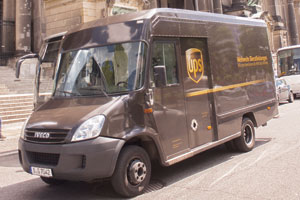Growth in International Business Aids UPS’ Profits in 2nd Quarter

UPS Inc. second-quarter net income rose to $1.23 billion, or $1.35 per share, helped by stronger results in the international sector, the parcel carrier said last week.
The results represented a 9.9% increase over last year’s second-quarter net income of $1.11 billion, or $1.21 per share, excluding a $665 million adjustment for pension-related costs. Revenue dipped 1.2% to $14.1 billion, affected by fuel surcharge and currency factors. Shipment totals rose 2.1% to 1.1 billion packages.
“We are making good progress this year,” CEO David Abney said on a conference call. “The strong momentum in our international segment is expected to continue. We are very pleased with all three of our business units. We are clearly moving in the right direction to achieve our full-year financial objectives.”
While projecting continued earnings growth, Abney also said, “We are a little bit cautious about the U.S. economy. We want to see if the manufacturing sector rebounds” after first-half weakness.
The Atlanta-based company, which ranks No. 1 on the Transport Topics Top 100 list of the largest U.S. and Canadian for-hire carriers, now expects to be near the “high end” of its full-year earnings forecast of $5.05 to $5.30 per share.
An analyst report noted the progress.
“We remain optimistic about the long-term prospects of the company [and the industry],” said a report from Arthur Hatfield, an analyst at Raymond James. “Fourth-quarter performance and expectations loom large, with the key to that performance being the company’s pricing strategy. The first half of 2015 shows the company has the ability to move forward in that direction.”
International operating profit increased $81 million, or 18%, to $552 million. A 3.6% rise in shipments and better pricing improved profit margins, helped by intra-Europe business growth. Revenue fell 6.4% to $3 billion, hurt by a $251 million reduction due to currency exchange rates.
On the domestic package side, where currency wasn’t a factor, profit before interest and taxes rose 3% to $1.2 billion and revenue increased 1.6% to $8.81 billion, including better results for ground and deferred business.
Deferred business volume rose 15%, and revenue climbed 6.4% to $878 million, but the growth pace of business to consumer shipments slowed. Ground business volumes rose 0.9%, and revenue increased 2.1% to $6.3 billion.
Profit at the supply chain and freight business increased 18% to $207 million, helped by increased earnings in the forwarding business tied to pricing improvements. That unit’s revenue dropped 4.5% to $2.24 billion.
Less-than-truckload carrier UPS Freight raised revenue per 100 pounds of freight by 1.4%, but LTL revenue fell 3.9% to $647 million. Tonnage declined 5% and shipments fell 0.3%. The unit’s profitability wasn’t disclosed.
When asked about news reports that UPS was in talks to acquire brokerage Coyote Logistics, Abney said, “UPS does not discuss M&A activities, just due to confidentiality and competitive reasons.”
Last month, Bloomberg News and others said UPS was in talks to buy Coyote for $1.8 billion. The brokerage is No. 39 on the TT Logistics 50 with annual revenue of $2.09 billion. (UPDATE, July 31: UPS agrees to acquire Coyote.)
If UPS does make a deal, it would mark a significant expansion of its existing brokerage business, which is included in truckload activity reported as part of the freight unit. The truckload service generated $63 million in second-quarter revenue, or less than 0.5% of the corporate total.
Last September, UPS Freight Vice President Ken Burroughs told TT the unit was seeking to expand brokerage activity to add new capabilities in a fast-growing sector where the company does not currently have a major presence.
“Brokerage is growing, and we see this as a natural evolution of the product the company can offer,” he told TT at that time, without giving specific targets other than “double-digit growth indefinitely.”
UPS is a “relatively small brokerage,” Burroughs said. “We’re nowhere near the Coyotes.”
If an acquisition occurs, it would be the latest consolidation step in the logistics industry, where companies such as XPO Logistics and Echo Global Logistics have made recent deals.
In last year’s second quarter, UPS net income was $454 million, or 49 cents, including the pension-related costs for union retirees.
For the first half of 2015, net income was $2.25 billion, or $2.48 per share. Excluding pension effects, 2014 period net was $2.03 billion, or $2.19. Revenue rose 0.1% to $28.1 billion.




